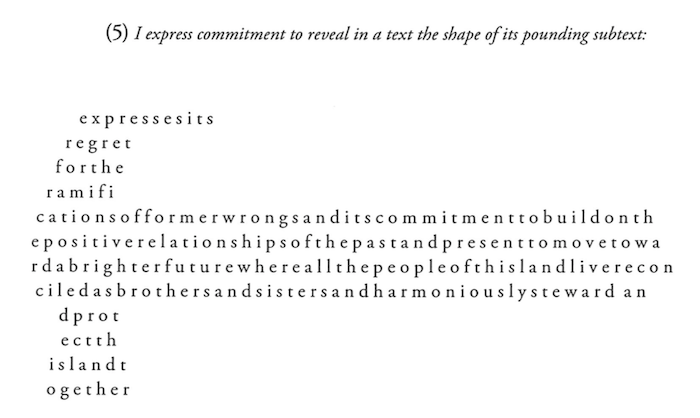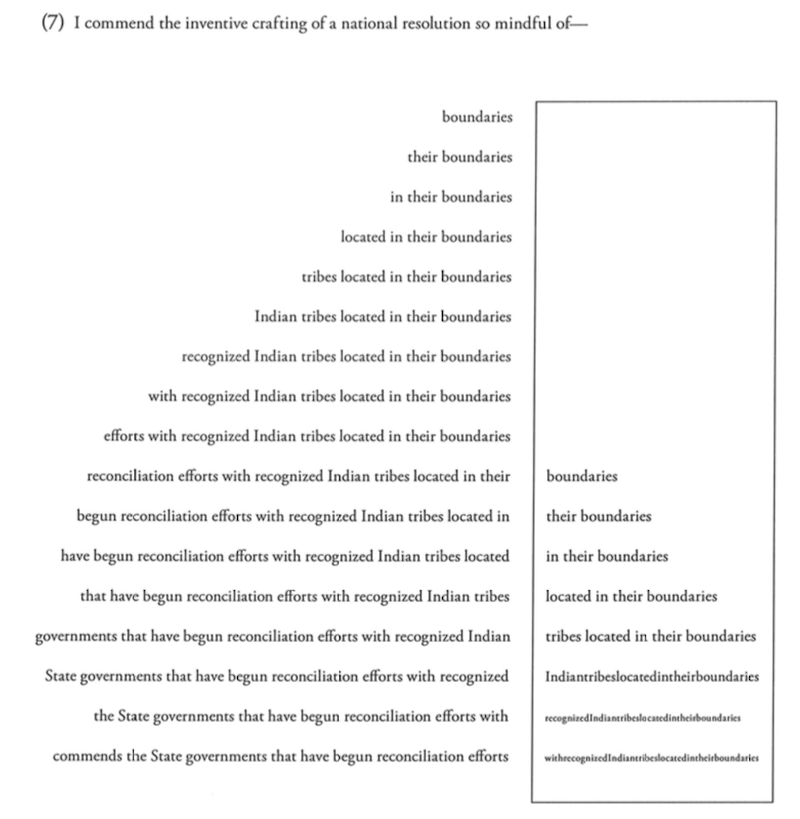Layli Long Soldier’s Whereas confronts the coercive language of the United States government in its responses, treaties, and apologies to Native American peoples and tribes, and reflects that language in its officiousness and duplicity back on its perpetrators. Long Soldier’s work has been described as, “Elegant and painful, formally surprising, personal and historic […] a fearless, polyphonic crossing of cultures and languages in the service of both tenderness and trenchant critique.”
RESOLUTION 5
From the Congressional Resolution of Apology to Native Americans (S. J. Res. 14—111th Congress (2009-2010)):
RESOLUTION OF APOLOGY TO NATIVE PEOPLES OF THE UNITED STATES
Acknowledgment of Apology. –The United States, acting through Congress–
(5) expresses its regret for the ramifications of former wrongs and its commitment to build on the positive relationships of the past and present to move toward a brighter future where all the people of this land live reconciled as brothers and sisters, and harmoniously steward and protect this land together;
Layli Long Soldier responds:

RESOLUTION 6
Below is Long Soldier’s “Resolution (6),” from a sequence that responds to the 2009 Congressional Resolution of Apology to Native Americans. After the opening paragraph, the text at left is from Mark K. Tilsen (Pine Ridge, South Dakota) in his Facebook post, September 20, 2016; the text at right is from Waniya Locke (Standing Rock, North Dakota) in a personal interview conducted by the author, September 19, 2016.
(6) I too urge the President to acknowledge the wrongs of the United States against Indian tribes in the history of the United States in order to bring healing to this land although healing this land is not dependent never has been upon this President meaning tribal nations and the people themselves are healing this land its waters with or without Presidential acknowledgment they act upon this right without apology:
To speak to law enforcement
these Direct Action Principles
be really clear always ask
have been painstakingly drafted
who what when where why
at behest of the local leadership
e.g. Officer, my name is _______
from Standing Rock
please explain
and are the guidelines
the probable cause for stopping me
for the Oceti Sakowin camp
you may ask
I acknowledge a plurality of ways
does that seem reasonable to you
to resist oppression
don’t give any further info
*
People ask why do you bring up
we are Protectors
so many other issues it’s because
we are peaceful & prayerful
these issues have been ongoing
“isms” have no place
for 200 years they’re interdependent
here we all stand together
we teach the distinction
we are non-violent
btwn civil rights & civil liberties
we are proud to stand
btwn what’s legal & what isn’t legal
no masks
the camp is 100% volunteer
respect locals
it’s a choice to be a Protector
no weapons
liberty is freedom
or what could be construed as weapons
of speech it’s a right
property damage does not get us closer
to privacy a fair trial
to our goal
you’re free
all campers must get an orientation
from unreasonable search
Direct Action Training
free from seizure of person or home
is required
& civil disobedience: the camp is
for everyone taking action
an act of civil disobedience
no children
now the law protects the corporation
in potentially dangerous situations
so the camp is illegal
we keep each accountable
you must have a buddy system
to these principles
someone must know when you’re leaving
this is a ceremony
& when you’re coming back
act accordingly
RESOLUTION 7
From the Congressional Resolution of Apology to Native Americans (S. J. Res. 14—111th Congress (2009-2010)):
RESOLUTION OF APOLOGY TO NATIVE PEOPLES OF THE UNITED STATES
Acknowledgment of Apology. –The United States, acting through Congress–
(7) commends the State governments that have begun reconciliation efforts with recognized Indian tribes located in their boundaries and encourages all State governments similarly to work toward reconciling relationships with Indian tribes within their boundaries.
Layli Long Soldier responds:




